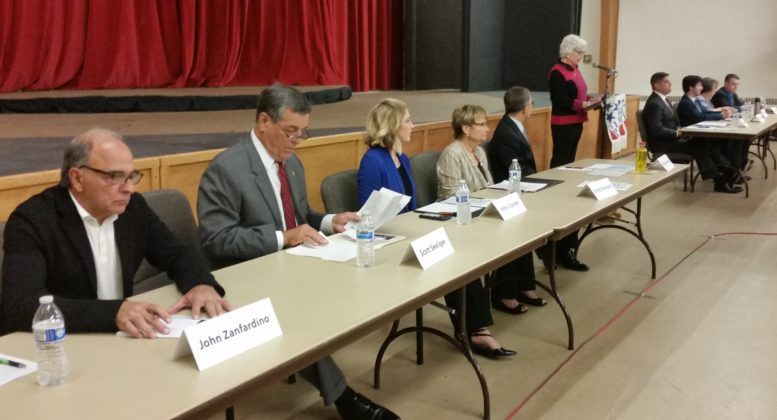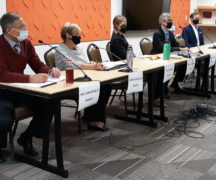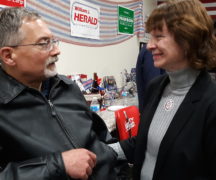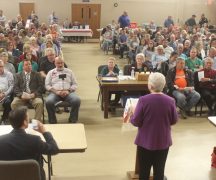By JAN LARSON McLAUGHLIN
BG Independent News
Bowling Green council candidates were asked to take stands on substandard rental housing, roundabouts, the school levy, streets and more Sunday evening.
This year’s election is crowded with 12 candidates for Bowling Green City Council. So the candidate forum, sponsored by the Bowling Green League of Women Voters, gave some city residents their first glimpse at those on the ballot. They are:
At-large council – Six are running for two seats: Holly Cipriana, Nathan Eberly, Beverly Elwazani, Carolyn Kawecka, Gregory Robinette and Sandy Rowland. Kawecka was not present.
First Ward: Daniel Gordon and Hunter Sluss. Sluss was not present.
Second Ward: Kent Ramsey and John Zanfardino. Ramsey was not present.
Third Ward: Michael Aspacher is running unopposed, so he did not participate in the forum.
Fourth Ward: William Herald and Scott Seeliger.
Following are the answers given by candidates to citizens’ questions.
Cipriani, a Democrat who works as an academic adviser at Bowling Green State University, believes she can be a voice for residents of the city. She said she can offer a “fresh perspective” on issues and isn’t afraid to take action to solve problems.

Holly Cipriani
Cipriani said she is “very passionate” about the Complete Streets program as a way to promote safety for bicyclists, pedestrians and motorists. She would like to use already conducted research to identify areas of the city were bike lanes can be added.
As for the city’s budget difficulties, Cipriani wants to make sure state leaders realize the impact of the money cut to local government budgets. The city needs to focus on improving neighborhoods, infrastructure and schools in order to get families to stay here, and attract new families to come here. That would help grow local revenue, she said.
In response to the question on rental unit requirements, Cipriani said before buying her home, she lived in several different rentals in the city. “I see how some of these issues can drive people out,” and lead them to look for housing in Perrysburg and Maumee, she said. Cipriani supported putting regulations in place for rental housing.
When asked to voice their stands on the school levy and the city charter amendment, Cipriani said she realized the school levy would be a significant tax increase, but it will be worth it to stay competitive with other districts. As far as the charter amendment, Cipriani said while she supports the intentions behind it, the city charter is not the right place for it.
On the topic of roundabouts, Cipriani said she supports the city’s use of them on East Wooster Street. Studies show they cause less wear and tear on the roads, so while they may be more expensive up front, they will be an investment in the future. Roundabouts also lead to fewer head-on and T-bone crashes, she said.
Eberly, an Independent who works as a financial and business adviser, said he has encountered many Bowling Green residents who are frustrated with the city. “We as a town are kind of stalled,” he said. Eberly talked about reoccurring issues that never get solved – like rental housing problems and restrictive policies for food truck businesses.

Nathan Eberly
On the Complete Streets issue, Eberly said the city “lost an opportunity to really get things rolling.” Instead of adding bike lanes to Fairview and Conneaut streets, sharrows were painted on the streets. He suggested Bowling Green look at other towns of similar size and young demographics to see how they handle the issue.
As for the budget problems, Eberly said the city needs to realize the state money is gone. “We need to stop relying on the state to hand us back money.” Instead, the city needs to look for homegrown revenues by attracting more residents and businesses to Bowling Green.
To deal with substandard rental housing, Eberly suggested public and private entities need to come together to provide incentives for safe housing. Homes that pass licensed inspections would get a gold star, which would let renters know they are safe to lease.
Eberly said while he was against the last school levy, he supports the school bond issue on the November ballot. “I became a believer,” he said. Though it will be expensive, Eberly referred to the levy as “an investment” in the community. As for the charter amendment, he said he is “adamantly against” the issue, which he believes will be found unconstitutional.
On the issue of roundabouts, Eberly said there are proven benefits. He supports the city using them in strategic places, where they will limit accidents and improve traffic flow.
Elwazani, of the Green Party, has been a community volunteer. While campaigning, she has found many local residents who want the chance to vote outside the two-party system. As a member of the Green Party, she promised to offer different solutions.

Beverly Elwazani
As for Complete Streets, Elwazani suggested the city create more one-way streets, which may be inconvenient for cars, but better for other types of traffic. “It’s important we make our roads accessible to everyone.” More millennials will be attracted to Bowling Green if the streets are more accommodating to bicyclists and pedestrians, she said.
To make up for lost funding from the state, Elwazani said the city should focus on community improvements that will reap rewards. “We really have to grow our tax base,” by offering a safe community, good parks, green businesses and good schools. “We can’t compete with other communities if we don’t have good schools.”
When talking about rentals, she said 60 percent of the city’s housing are rental units. The city needs to set standards and license properties. “We should provide housing that is warm and safe,” she said. “It’s a matter of social justice for those who rent.”
Elwazani said she supports the school levy. “It’s time that we renovate,” she said. “No student should have to go to school and sit where it’s 100 degrees.” And while she supports the spirit of the charter amendment, she added that the wording makes the issue unenforceable.
Spending some time overseas, Elwazani likes the idea of roundabouts. “Most of you guys don’t know how to use them,” she said with a smile. They will reduce traffic accidents, she said. “They are a good investment in the safety of our citizens. They really do work.”
Robinette, a Republican, is an engineer, attorney and retired Army colonel. He previously served on city council, but had to step down when he was deployed overseas. Robinette served on the city planning commission and zoning board of appeals. He promised to look for creative ways to increase the city’s revenue and tax base.
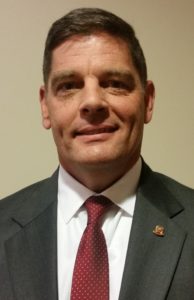
Gregory Robinette
On the topic of Complete Streets, Robinette said the city should first determine the definition and scope of the program. While safety and access to streets are important, so is the city’s responsibility to be good stewards of taxpayers’ money. The improvements must be “carefully and strategically planned” before the city dives in, he said.
While the city needs to continue talking with the state about the funding cuts, leaders must make sure the city is attractive to businesses and families, he said. The city is not likely to win back money from the state, but it can increase its tax base through economic development, good schools, safety services, good utilities and zoning codes.
As far as rental units, Robinette said the city should pinpoint the problems that need fixed. He suggested a top-to-bottom review of the zoning code. “I think that process will take us a long way,” he said. “Everyone should have access to safe housing.”
Robinette said he supports the school levy as good for the entire community. “Doing nothing is a bad option.” But he is opposed to the charter amendment, which he believes will be found unconstitutional.
As another person who has spent time overseas, Robinette said roundabouts work very well. “I think folks will adapt to it rather easily.” He said the addition of roundabouts should be done in the normal course of the city budget.
Rowland, a Democrat who is a Realtor and former regional director of the Humane Society of the U.S., has served on city council for six years. She currently serves on the parks and recreation, and the planning and transportation committees.
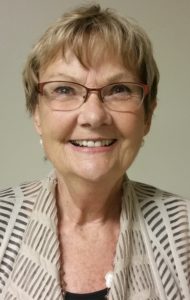
Sandy Rowland
The Complete Streets concept means the streets should accommodate people of all ages, abilities and modes of transportation. “It’s to save lives,” Rowland said. They city is making progress by identifying where people want bike routes, and by bringing the YAY Bikes training to the community for safe bicycling.
Rowland said the state has taken millions of dollars in government funds, but Bowling Green officials remain responsible with the budget. “We have not had a deficit,” she said. “We have been responsible all along with our funding.”
The issue of rental housing is the “elephant in our city,” she said. She said the figure she heard for rental units in the city is 62 percent. “We allowed ourselves to get way out of line a long time ago,” she said. The proposed Community Action Plan suggests standards be adopted. “Some of the housing is so bad they are calling for it to be torn down and replaced.” The rental units need inspections, “and we need it now,” she said.
Rowland said she supports the school levy. “It’s our community,” not just the schools, she said. As a Realtor, “people want to see the schools.” But once they see the old buildings, “I’ve been told time and time again, let’s just go to Perrysburg.” Passage of the school levy would bring more people and tax base to the city. As for the charter amendment, Rowland said the city charter is not the proper place for the issue.
Though Rowland said she seeks out community feedback on issues before voting, she did not follow her rule when she kept hearing complaints about the proposed roundabouts. “I didn’t listen to what the community told me. It’s about safety,” she said. “They are here to stay. You will adjust.”
Gordon, a Democrat who manages the office of an adoption agency, has served on council for six years. He spearheaded the creation of Ridge Park, and believes in defending those marginalized in the community.

Daniel Gordon
While the Complete Streets concept has growing support, the momentum has stalled, he said. “Not everybody in town can afford a car,” he said. Students need safe bike routes to school, and some streets are still in need of sidewalks. “If Perrysburg can do it, then Bowling Green can do it.”
The state funding cuts are the “fundamental problem facing Bowling Green,” he said. “They have stripped away money” from cities to solve state funding problems. Gordon suggested that Bowling Green should help launch an aggressive campaign with other communities, “to demand that we get our money back.”
As for poorly maintained rental units, Gordon said, “We’re letting down our residents when we have apartments that aren’t safe.” Apartments should be screened to make sure they are safe, with licensing of those that pass. “It’s a basic obligation to residents.”
On the two ballot issues, Gordon said the school levy is an issue of equity for kids. “I support schools, so I support our school levy.” But on the charter amendment, he voiced “serious reservations about the language in the amendment.” He said an ordinance may be a better approach for the issue.
Gordon said he realizes a lot of Bowling Green citizens are skeptical of the roundabouts, but some education should help. “They’ve been proven to be safe,” he said. The roundabouts on East Wooster should not only improve safety but also improve the appearance of the city entrance from Interstate 75.
Zanfardino, a Democrat who has served on council for 12 years, is retired from middle management positions with several social service agencies. He said he is willing to act on issues. “I believe I bring a bold voice to Bowling Green,” he said.

John Zanfardino
On the Complete Streets issue, Zanfardino said the city is trying to piggyback bicycling improvements on street construction projects. Though some had hoped for dedicated bike lanes on Fairview and Conneaut avenues, the cost was too great so sharrows were painted on the streets. “I think they’re a great beginning,” he said.
In response to the general fund revenue decline, the city had to make the difficult decision to start charging a fee for garbage collection, Zanfardino said. Since the state isn’t likely to end its cuts to local governments, Bowling Green needs to focus on economic development, improving the city’s “declining” housing stock, and passing the school levy. “A lot of people who work here don’t live here,” but that could change with improvements, he said.
On the topic of rental housing, Zanfardino said the city needs to revisit the idea of licensing, even though it was quite contentious when first brought up a few years ago. He talked about a house that was recently found to have 13 fire code infractions, and that’s “not that atypical,” he said. One idea is to offer voluntary inspections, and those that pass would be put on a preferred list for renters.
Zanfardino supports the school levy which will replace some buildings constructed in the 1960s. The charter amendment is a “flawed document,” he said. But the pipeline approval process is also flawed, he added. “It’s a rubberstamp if there ever was one.” So he plans to support the “laudable” effort of the charter amendment.
The roundabouts will not only reduce accidents and car emissions, but they will make the city’s entrance more attractive, he said. The city should “proceed with caution,” with funding from ODOT, he said.
Herald, a Republican who served as Fourth Ward council member for eight years, has an analytic background. “I’ve been working hard to earn your vote,” by attending 95 percent of city council meetings, plus several city board and commission meetings.
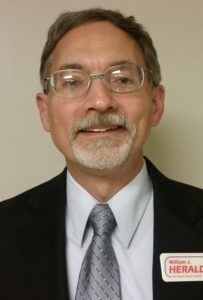
William Herald
Since he has attended all the bicycle commission meetings, when asked about Complete Streets, Herald reported that “they are working diligently to put together a plan of different routes.” The group is considering custom made solutions. “One solution may work in one spot, another may work in another.”
In response to the budget problems, Herald suggested the city focus on economic development as a way to grow businesses and make Bowling Green a community people want to move to.
The rental unit issue has been discussed before, he said, but with no results. “We need to again research it and then take action,” he said. “This particular problem is in every ward.”
On the topic of the school levy, Herald said the issue is directly tied to economic development. The key is to find the balance between the amount spent on schools and the property tax collected from residents. Herald, who said he has knocked on more than 2,500 doors while campaigning, said many people are concerned about the school levy. As far as the charter amendment, “I really wanted to support it,” he said. “The intent was good, but the wording got in the way.”
As for roundabouts, Herald said he is in favor of using them, if they fit the situation. They would be good as “part of our arsenal” for streets.
Seeliger, a Democrat who is currently on city council, formerly worked in athletics at Bowling Green State University and Bowling Green High School. He has experience in writing for grants. “I want to give back to a community who’s been very, very good to me,” he said.
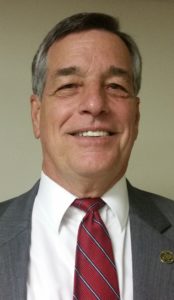
Scott Seeliger
When asked about Complete Streets, Seeliger said the city is working on more awareness about bicyclists and becoming a bicycle-friendly community. “We don’t have streets that are real wide and we can dedicate bike lanes,” he said. Some streets also need curbs and sidewalks. “We need to be looking at all of it.”
On the budget issue, Seeliger said state officials should be made aware of the problems caused by the cuts. But the city can also work on improving economic development and its housing stock, by adding more homes in the $180,000 to $220,000 price range. By bringing more jobs and more residents, “we increase our revenue,” he said.
As far as rental housing, he said the new Community Action Plan takes “baby steps,” toward improvements. The city needs to look at its zoning laws to “make people accountable,” he said. Teamwork is needed, with city officials meeting with homeowners on “how can we make this neighborhood better.”
Seeliger said he supports the school levy. “This school levy is needed. Everyone around us has these new schools,” he said. If the levy doesn’t pass, then the district will have to just do “band-aid” repairs, and then pay more later for new buildings. As for the charter amendment, Seeliger said the charter document should be reserved as a blueprint for city operations, not for legislature.
Roundabouts are preferable to waiting at four-way stops, as long as the city chooses where they are located carefully, he said.

